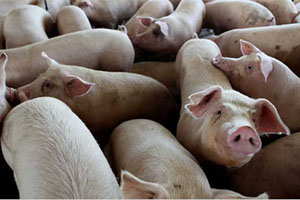Canada: Porcine Epidemic Diarrhea Virus update

The Canadian Swine Health Board is telling pork producers to be extra vigilant with their herd biosecurity, given that Porcine Epidemic Diarrhea Virus has been found in North America for the first time.
Cases have suddenly appeared on multiple unrelated farms in the Midwest US states. There are ongoing investigations to determine the origin and common risk factors. In the meantime, given the widespread trade of pigs and movement of vehicles, all producers in North America should increase their farm’s biosecurity. To date, this virus has not been identified in Canada.
It is important to note that this disease is not transmissible to humans and does not affect the meat or meat products.
Porcine epidemic diarrhea is caused by a coronavirus distinct from Transmissible Gastroenteritis virus (TGE). This virus has been widespread in Europe and Asia, and active in China since 2010. Like TGE, the virus damages the villi in the gut thus reducing the absorptive surface, with loss of fluid and dehydration.
After introduction of the virus into a naïve breeding herd there are acute outbreaks of diarrhea with up to 100% of sows affected, showing mild to very watery diarrhea. In nursing piglets the disease can be mild or severe with mortalities up to 40%. In growing pigs there is widespread diarrhea with low mortality.
Strong herd immunity develops over two to three weeks. In large breeding herds, particularly, herds with separate populations, not all the females may become infected first time round. There may be reappearance in piglets suckling from sows with no maternal antibodies and new clinical signs may become sporadic.
Two clinical pictures are recognized: 1) where only growing pigs are affected: this will likely occur in herds where there is some maternal immunity; and 2) the acute form that affects all ages including nursing pigs and mature sows: this is likely to occur during an outbreak in a naïve population.
Diagnostically this disease must be differentiated from TGE.
Like the TGE virus, PED virus survives well in cold weather. It can be spread through infected pigs, manure contaminated trucks and equipment, and mechanical transmission by birds or wildlife. Particular care should be given to cleaning vehicles returning from affected areas, as well as feed ingredients and other potential fomites.
Producers seeing signs of widespread diarrhea in their herds should contact their veterinarian for a specific diagnosis, and take care to avoid exposing other farms. Producers are also encouraged to reference CSHB’s National Swine Farm-Level Biosecurity Standard, available at www.swinehealth.ca







